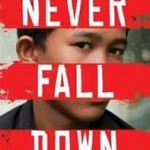Never Fall Down by Patricia McCormick
Balzer & Bray, $17.99
What does it take to survive when you’re only nine years old and you’re separated from the rest of your family by a violent regime? In the abstract, we can imagine that we’d do all that is humanly possible to survive. It’s in the personal survivor stories that we discover through all the horror shoved up against faith in humanity, and all the pain and fear hurled against hope, the gruesome possibilities survival might entail. National Book finalist Patricia McCormick has given readers this personal view in her novel Never Fall Down, based upon the real life story of Arn Chorn-Pond, who survived forced marches, labor camps and the life of a child soldier under the Khmer Rouge before being adopted and brought to the United States. Relying upon interviews with Chorn-Pond and mimicking his diction, the voice of the child Arn rises up from the page to meet readers and open our eyes to the power of this boy’s spirit as he survives the Cambodian killing fields.
When the Khmer rouge arrive in Arn’s village, his aunt warns Arn and his 10 siblings, “Be like the grass. Bend low, bend low, then bend lower. The wind blow one way, you bow that way. It blow the other way, you do too. This is the way to survive.” He takes the warning to heart and so he learned to bend as he’s told and never fall down because, if he does, he will die. Living on watery rice soup, often less than one bowl a day, he also discovers that to bend also means to fight to live, to take some chances, so that he can survive starvation and neglect. When a soldier asks if anyone knows how to play music, Arn raises his hand. He is chosen, along with five other boys, to learn new music of the new regime. Meanwhile, older musicians and music teachers are being slaughtered so that none of the old culture can remain. Arn’s first teacher, an old man who teaches the boys to play as light as the wings of a hummingbird, tells him so. He tells Arn to play for his life, to survive. Arn never learns this teacher’s name but he learns a great lesson. He says, “I think of the old music teacher. How he give me, in one week, his whole life. I don’t know music, only what he taught me, but maybe I can try to teach these kid a little bit and we all can live.”
With the will to survive, Arn plays with a smile, earning extra food for himself and his fellow band members. But these boys are still starving and there is death all around. Even as Arn encourages the new music teacher to teach the boys more so that they can suvive, Arn acknowledges, “When he wake up, he think of his own children and wonder if maybe it’s better to die. ‘To live with nothing in your stomach and a gun in your face,’ he says, ‘is that living or is that dying a little bit every day?’”
The killing escalates and soon Arn is taken by a soldier to work as a “little fish,” one of the youngest of soldiers who is used as bait. Again, Arn’s will to survive overrides all else. When he discovers the rush of choosing to kill or die, he considers how it changes him. He says, “Dead I think. This guy is dead. And I’m the one who do it. I feel crazy, like not myself, like shooting machine. Like maybe I can shoot and shoot forever.”
As a soldier who has been forced to fight and kill for this merciless regime, Arn recognizes, “You think you never can get used to a thing this sad, kid dying, but you do. You think maybe you want to die also. But you don’t./ You not living. And you not dead. You living dead.”
While Arn’s story conveys the atrocities of genocide, it also delivers a message of hope and redemption when a Congregationalist minister, Mr. Pond, sees the spirit to survive as Arn’s strength and brings him to the United States along with two other boys. If this story were handled by a less adept writer, the reader might be left with this upbeat ending, but McCormick allows readers to continue Arn-Pond’s real journey, one that is filled with a restless inability to cope with the knowledge that he killed fellow Cambodians to survive. Readers are left with the image of this very real man, whose story has been told within the structure of a novel. We see him act and speak about the killing fields again, and again and the horror of the killing fields, all the while seeking forgiveness and peace. The hope here is that his redemption may be at hand through his current work researching, recording and teaching Cambodia’s arts by finding performers who can work as mentors to new generations.
